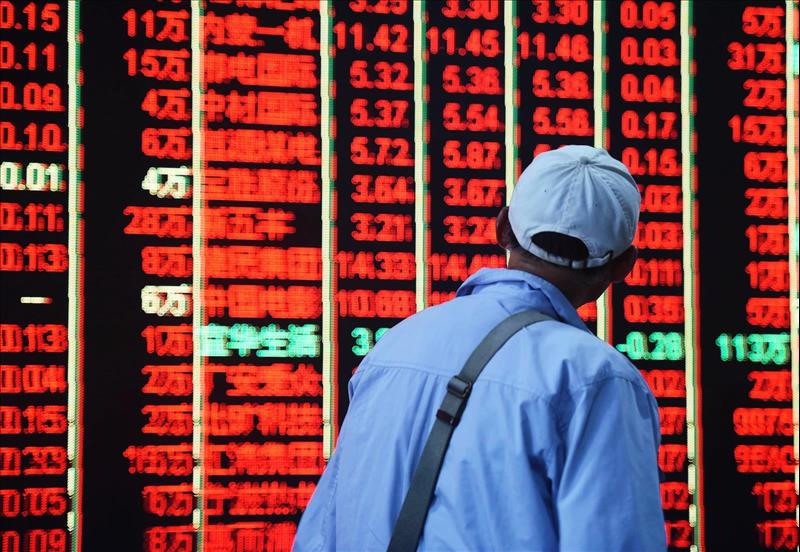(MENAFN- Asia Times) China's bull run stock market reversed this month with the benchmark Shanghai Composite index retreating more than 10% from a February high, a result of regulators turning off the liquidity that drove share prices up.
Market exuberance fizzled out almost instantly during the first week of March, when many stock funds scrambled for an exit from the sectors they had overweighted, causing share prices to plunge further amid a stampede for the exits.
The ongoing market reversal may become the first hard lesson for the millions of youngsters born in the 1980s and 90s as well as millennials, who are novices at stock market investment and were reeled in to bet their money when the Chinese market kicked off the year of Ox with a bang.
One indicator of how quickly the bottom dropped out of the market was the close to 20% accumulative slump since February in the net value of several popular stock funds tracking the main board in Shanghai and operated by the Shenzhen-based broker E Fund.
Its equity funds are usually high up in the rankings of recommended picks on Alibaba's ubiquitous mobile payment and wealth management app AliPay, where these Generation Z rookie investors were inducted into stock and fund management.
Rather than employing sound investment strategies and theories, many merely opted for the best-ranking funds for their first adventure into China's then-red hot stock market. The threshold was as low as a few hundred yuan and first-time punters could also invest in tranches.
Some of them who ended up losing all their money told China's influential Southern Weekend newspaper that they picked E fund simply because it constantly occupied the top spot of AliPay's rankings, with some admitting they had never bothered to study service contracts or the actual portfolio holdings of fund managers until after the value of their investment plummeted.

Chinese stock market. Photo: iStock
The herd mentality was there as E Fund became the darling of virtually all newcomers since the second half of 2020 thanks to its impressive rankings and other performance metrics on AliPay and other popular mobile platforms that only highlighted short-term returns.
The constant inflow of capital propelled the fund company to surpass established brokers and trading houses to become China's top stock fiduciary fund by size.
Collectively, the total value of China's stock funds swelled from 5.62 trillion yuan (US$864.1 billion) at the end of October 2020 to close to 7 trillion yuan in January, according to the Asset Management Association of China, which is affiliated with the market watchdog China Securities Regulatory Commission.
Profiling data from the Guangzhou-based market information cruncher MobTech shows that 20 million new investors flocked to China's stock and fund markets in the first half of 2020 alone, 60% of them aged below 35.
With most of them now nursing losses, China's second-hand goods trading platform Xianyu, also owned by Alibaba, saw 200,000 new user registrations in the past week. The operator of the online flea market attributed the surge in new users to the big swings on the stock market, whereby cash-strapped, loss-hit retail investors now need to pawn personal items for money.
The herd mentality is equally ruling the roost among fund managers who supposedly should uphold professionalism and play long-term.

An investor walks past a screen displaying stocks rising in good times (red is up and green is down) across the board in Shanghai. Photo: AFP
For stock funds to climb to the top of many rankings and maintain their positions, they need a higher concentration of the much-sought-after shares of baijiu (Chinese liquor), semiconductor and healthcare firms – sectors that fueled the previous rally – in their increasingly homogenized portfolios.
One extreme example revealed by the Southern Weekend saw a junior manager with the Shenzhen-based Lion Fund who only had one year of experience but once took care of 40 billion yuan worth of funds, all heavily focused on baijiu and semiconductor stocks.
The rationale, according to a Shanghai-based manager who declined to be named, is that piling aggressively into popular and soaring stocks like top baijiu brand Kweichow Moutai and leading lithium battery producer Contemporary Amperex Technology was a perceived surefire bet when their prices surged to giddy heights.
'Of course risks get more concentrated when all funds scramble for just a handful of popular stocks and their prices will fall faster and more violently,' the fund manager said. 'But we fund managers have to maintain our best ranking as sale of our products and our pay are all depending on it so we have to chase red-hot shares.
'What goes up must come down and Kweichow Moutai is now worth 2,010 yuan per share, compared with its high of more than 2,600 in February, [so] certainly we and our clients are losing money.
'But that is not a big problem when everyone is suffering as almost every fund was overweight in baijiu shares. No investors will blame fund managers when all of them are losing money, they will only say it's now a bear market so we face almost no repercussions, not even a rap on the knuckle, even when our irrational strategy goes wrong,' the fund trader said.
He said his team once thought of pulling back from some stocks most at risk of a reversal in February when their surges appeared to be running out of steam, but decided to stick around fearing if the rally continued their move to underweight key stocks when their competitors were still piling in would drag down their returns rankings.
'No one cares about long-term visions, not even our clients. If we act in their best interests to be more prudent, we could have helped them avoid losses but we may also be risking being knocked off the top of rankings and abandoned by clients who only look at short-term returns.'
Read more:
MENAFN20032021000159011032ID1101782039
Legal Disclaimer:
MENAFN provides the information “as is” without warranty of any kind. We do not accept any responsibility or liability for the accuracy, content, images, videos, licenses, completeness, legality, or reliability of the information contained in this article. If you have any complaints or copyright issues related to this article, kindly contact the provider above.